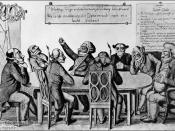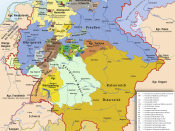The period of 1815 to 1848 in German history has been commonly referred to as Vormärz, or "pre-March" period in reference to the proceedings of the Congress of Vienna in 1815, up until the outbreak of riots in March and failed revolutions of 1848. Prince Clemens von Metternich's involvement in 'German' affairs during this period has been regarded by historians as very reactionary, and as an arch-conservative attempting to preserve the interests of the Austro-Hungarian Empire through his role as Austrian Chancellor, the failure of German liberalism and nationalism at this time has been attributed, in part, to him. Therefore, Metternich can be seen as one of the greatest challenges to German Nationalism during 1815 to 1848, although not the only one, and his actions in the creation of the "German Confederation", issuing of the Carlsbad Decrees and 'Six Articles' as well as formation of the Holy Alliance summarises his involvement during the 'Vormärz' years.
However, the reason Metternich opposed a united Germany was because the Austro-Hungarian Empire did not embrace a single people speaking one language, but many peoples speaking different languages. The empire would not easily fit into a united Germany and if nationalism spread in neighbouring Germany it would surely spread into Austria and not only present a threat to the structure of the Empire, but also foresee Metternich's downfall. Instead, Metternich desired the continued existence of the loosely organized German Confederation, which in 1815 he played a key role in creating as foreign minister for Austria during the Vienna Peace Settlements. At this Congress of Vienna, Germany was made into a loose confederation of states known as the "German Confederation" in order to maintain the balance of power in Europe and ensure Germany's security.
In essence the Confederation restored the borders of the former Holy...


